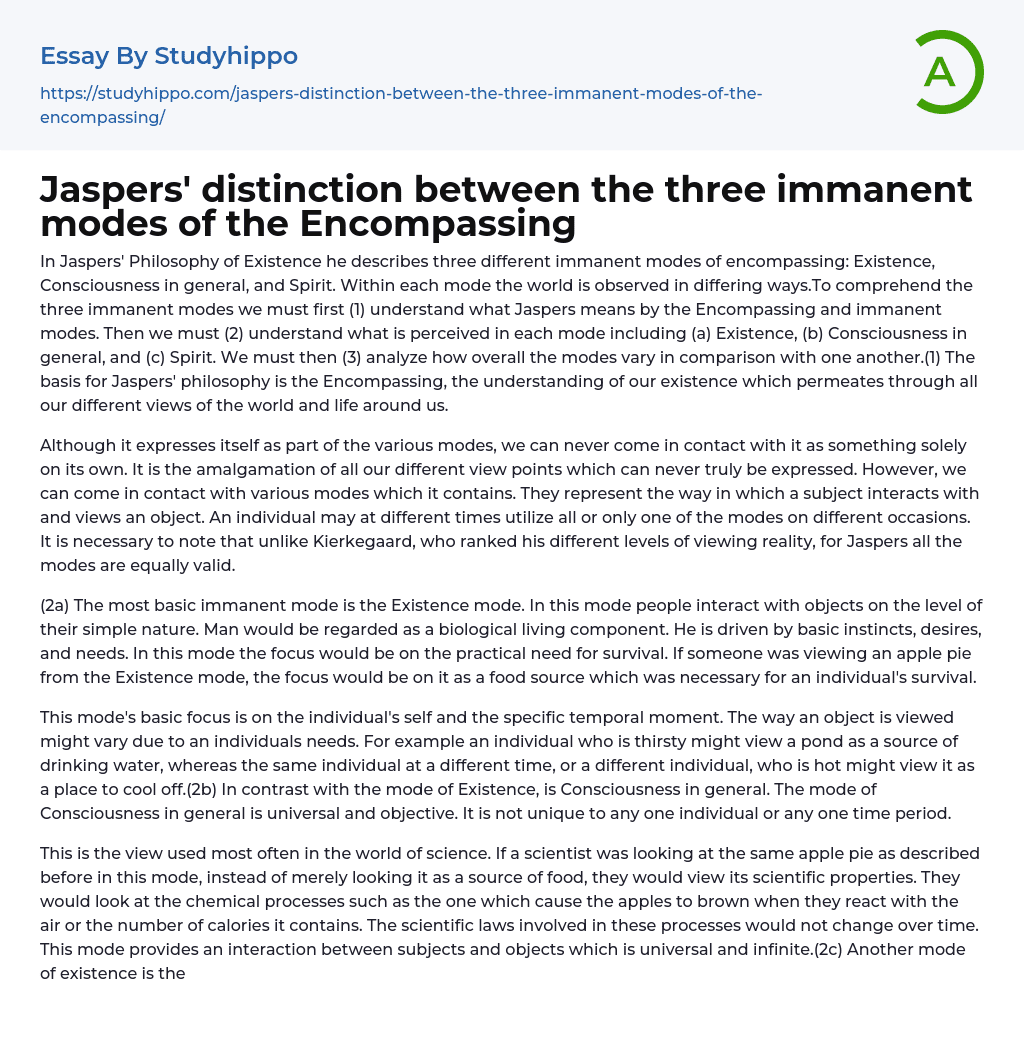

Jaspers’ distinction between the three immanent modes of the Encompassing Essay Example
In Jaspers' Philosophy of Existence he describes three different immanent modes of encompassing: Existence, Consciousness in general, and Spirit. Within each mode the world is observed in differing ways.To comprehend the three immanent modes we must first (1) understand what Jaspers means by the Encompassing and immanent modes. Then we must (2) understand what is perceived in each mode including (a) Existence, (b) Consciousness in general, and (c) Spirit. We must then (3) analyze how overall the modes vary in comparison with one another.(1) The basis for Jaspers' philosophy is the Encompassing, the understanding of our existence which permeates through all our different views of the world and life around us.
Although it expresses itself as part of the various modes, we can never come in contact with it as something
...solely on its own. It is the amalgamation of all our different view points which can never truly be expressed. However, we can come in contact with various modes which it contains. They represent the way in which a subject interacts with and views an object. An individual may at different times utilize all or only one of the modes on different occasions. It is necessary to note that unlike Kierkegaard, who ranked his different levels of viewing reality, for Jaspers all the modes are equally valid.
(2a) The most basic immanent mode is the Existence mode. In this mode people interact with objects on the level of their simple nature. Man would be regarded as a biological living component. He is driven by basic instincts, desires, and needs. In this mode the focus would be on the practical need for survival. If someone wa
viewing an apple pie from the Existence mode, the focus would be on it as a food source which was necessary for an individual's survival.
This mode's basic focus is on the individual's self and the specific temporal moment. The way an object is viewed might vary due to an individuals needs. For example an individual who is thirsty might view a pond as a source of drinking water, whereas the same individual at a different time, or a different individual, who is hot might view it as a place to cool off.(2b) In contrast with the mode of Existence, is Consciousness in general. The mode of Consciousness in general is universal and objective. It is not unique to any one individual or any one time period.
This is the view used most often in the world of science. If a scientist was looking at the same apple pie as described before in this mode, instead of merely looking it as a source of food, they would view its scientific properties. They would look at the chemical processes such as the one which cause the apples to brown when they react with the air or the number of calories it contains. The scientific laws involved in these processes would not change over time. This mode provides an interaction between subjects and objects which is universal and infinite.(2c) Another mode of existence is the Spirit mode.
This mode deals with interactions when viewed within the realm of cultural identity. It focuses on the way things are viewed by different social organizations such as a church or a country. Although, the perception might vary from one group
to another, such as people in Japan interacting with something differently than people from Brazil; those within the social unit would be united by a common idea. In this mode the apple pie would be viewed by Americans as a symbol of their country and pride.(3) For Jaspers the mode of the spirit partially reflects a unification of the modes of Existence and Consciousness in General. Like the consciousness in general mode, it contains a universal aspect for those within its group.
However unlike consciousness in general, it focus on specific historical time periods. This aspect is similar to that of the mode of Existence. The modes of Existence and Consciousness in general are the ones most opposed to one another, since the former focuses on the specific and temporal, while the later emphasizes the universal and eternal. Although the different modes vary, Jaspers believed they were all valid and contained their own specific sets of truths.
Each is an individual infinite entity, yet they are all united as aspects of the Encompassing
- Academia essays
- Higher Education essays
- Language Learning essays
- Studying Business essays
- Education System essays
- Study essays
- First Day of School essays
- Scholarship essays
- Pedagogy essays
- Curriculum essays
- Coursework essays
- Studying Abroad essays
- Philosophy of Education essays
- Purpose of Education essays
- Brainstorming essays
- Educational Goals essays
- Importance Of College Education essays
- Brown V Board of Education essays
- The Importance Of Higher Education essays
- Online Education Vs Traditional Education essays
- Academic And Career Goals essays
- Academic Integrity essays
- Brown Vs Board Of Education essays
- Distance learning essays
- Technology in Education essays
- Vocabulary essays
- Writing Experience essays
- Importance of Education essays
- Early Childhood Education essays
- Academic Degree essays
- Academic Dishonesty essays
- School Uniform essays
- Academic writing essays
- Cheating essays
- Bachelor's Degree essays
- MBA essays
- College Life essays
- Grade essays
- Diploma essays
- Phonology essays
- Sentence essays
- Filipino Language essays
- Pragmatics essays
- Millennium Development Goals essays
- History Of Education essays
- Graduate School essays
- Middle School essays
- School essays
- Special Education essays
- University essays



